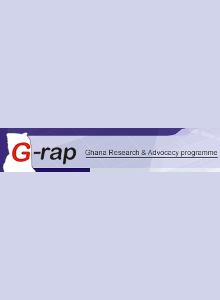Ghana Research Advocacy Programme (G-RAP)
- Profile
- Contact
The Ghana Research and Advocacy Programme “G-RAP” provides grants to Ghana based institutions engaged in pro-poor public policy research and advocacy. G-RAP provides core grant support – as opposed to project support – to strengthen the capacity and funding base of these institutions.
G-RAP funding targets institutions that can contribute to the national policy dialogue with government, parliament, district assemblies, donors, and non-state actors. Among the typical beneficiaries of G-RAP funding are think-tanks, development organisations and advocacy networks.
G-RAP is jointly financed by the United Kingdom, Canada, Denmark and The Netherlands. These four donor countries contribute to a pooled fund. The advantage of the pooled funding mechanism is that all donors share the same set of standards and reporting requirements. These donor countries also participate in the pooling of funds for the Multi-Donor Budget Support to the Government of Ghana, the MDBS.
G-RAP is in fact a complementary mechanism to the Ghana MDBS. G-RAP’s principal – but not exclusive – focus is to strengthen civic engagement in the Ghana Poverty Reduction StrategyGPRS. G-RAP aims to enhance the autonomy and capacity of NGOs to conduct evidence based research and advocacy that informs and monitors the GPRS pro-poor policy processes and implementation.
The term “RAO” – Research and Advocacy Organisation – has been coined for labelling the typical G-RAP Grantee. Organisations can be primarily focusing on research, advocacy or on both. This website contains profiles of grantees, as well as a link to their websites. The RAO community is a very diverse group of entities.




